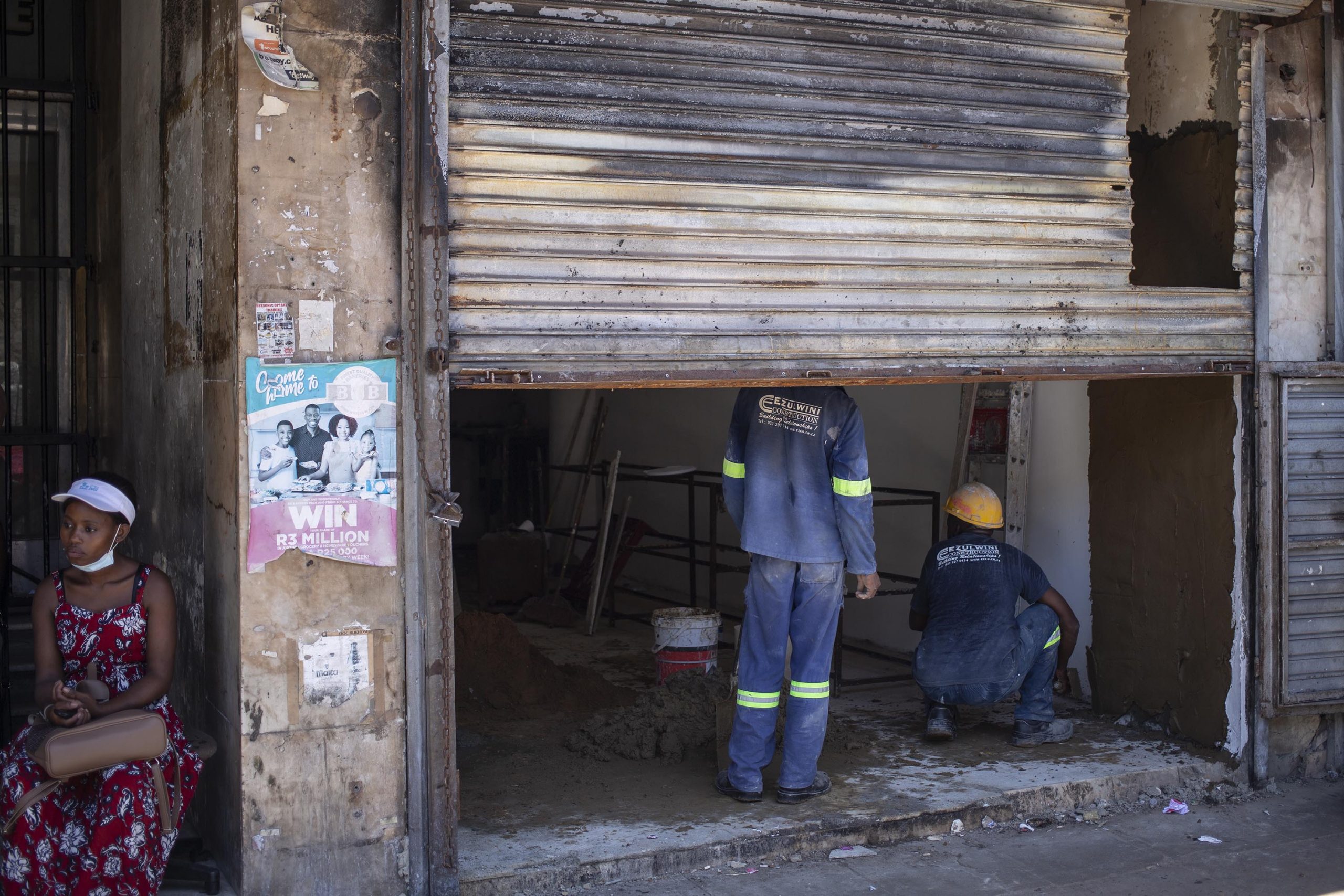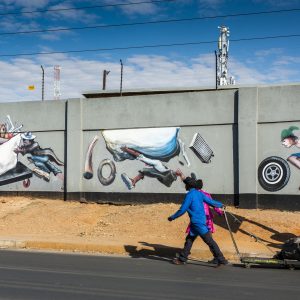Ruin in the aftermath of Durban’s xenophobic attacks
The Umkhonto weSizwe attacks on traders in the central business district have forced migrants in already precarious positions to start from scratch, again, while fearing for their lives.
Author:
17 February 2021

It is 3pm on a hot day in Durban. The sun is out, but the small flat Lidie Mkengana shares with three other asylum seekers and her children is dark and stuffy.
She drapes a towel across her thighs and uses her lap as a table to file and shape a customer’s nails. Mkengana, who is originally from the Democratic Republic of the Congo, primes their nails and then starts applying polish.
On a regular day, this would be her fifth client. But on this day [19 November 2020], it’s her first. This has been the case since members of the Umkhonto weSizwe Military Veteran’s Association (MKMVA) destroyed her manicure stall during a protest in November 2020 against migrants trading in Durban’s central business district (CBD).
“I was doing a customer’s nails. We knew a march was happening and we saw them coming, but we thought it will pass by as normal,” says Mkengana.
“Many people came there by Workshop [shopping centre] carrying sticks. They said they don’t want to kill us, we must leave South Africa and go back to our countries. I was so scared. I got up and told my customer that I cannot finish her nails. She wanted us to keep going. They started hitting us and beating, destroying our products and burning down our tents. We couldn’t save anything. I just ran to my flat empty-handed.”

Mkengana worked in one of the 150 stalls in the Church Walk market. People from different parts of the continent rent these stalls. Members of the MKMVA went through the market in November telling migrants to return to their home countries. The veterans attacked them and destroyed their goods.
There have been at least four such protests against migrants in Durban since Mkengana was attacked. The latest was on Monday 25 January, when a group of people looted and torched migrant-owned businesses in the CBD. This happened during an MKMVA-led march in the city.
The group accuses migrants of taking jobs and opportunities that could go to locals. They are also accused of committing crimes, particularly selling drugs.
Durban-based MKMVA member Zibuse Cele says the “problems in the country” started with migrants. “We fought to make South Africa free, but there is no freedom now [with migrants taking jobs and selling drugs].”
Unfounded belief
Many in South Africa hold the unfounded belief that migrants “steal jobs”. A group calling itself Only One South Africa marched to the Zimbabwean and Nigerian embassies in Pretoria last year demanding that people from those countries return home, citing jobs and crime.
According to Statistics South Africa, only about 7% of the population was born outside South Africa. This includes documented and undocumented people. Of this percentage, about 5.3% is of working age.
Related article:
Research done by the African Centre for Migration and Society shows that migrants are more likely to be employed informally and work under precarious conditions, with 27.1% of migrants working in the informal sector compared with 15.7% of South Africans.
The centre found that 12.4% of migrants work in private households as gardeners, childminders and domestic workers compared with 7.7% of South Africans in this sector.
As unemployment levels in South Africa increase substantially because of Covid-19 and lockdown restrictions, analysts warn that migrants will be the scapegoats for joblessness – regardless of what statistics and facts might say – and the chance of xenophobic attacks has increased.

‘Broken rainbow nation’
University of Johannesburg sociology professor Pragna Rugunanan says the fear and anxiety caused by the pandemic exacerbates the prejudice and increases anti-migrant sentiment as there is a fear of having to compete for limited or scarce resources.
“Xenophobic attitudes and attacks are driven by unsubstantiated perceptions that mainly African migrants are to blame for South Africa’s unemployment and poverty woes. Rather than interrogating structural, instrumental and political processes, and holding politicians accountable, the marginalised find it easier to scapegoat African migrants for their broken rainbow nation and unfulfilled dreams of a better South Africa.
“Many migrants reside in urban informal settlements where poverty and unemployment levels are high. The competition for scarce resources fuels xenophobic attitudes and scapegoating. The high crime statistics is another area where foreigners are blamed for contributing to the crime statistics. Despite such claims, there is no evidence to support these claims. While a link between poverty, unemployment and xenophobic attacks has yet to be shown, these are crucial triggers for ongoing xenophobic attacks in urban informal settlements,” says Rugunanan.

Mkengana says she doesn’t understand why migrants are accused of stealing jobs. She begins to cry as she recalls her journey to build her manicure business.
She came to South Africa 13 years ago, following the father of her child, who sent for her after he got settled. “My family was so poor, I didn’t even finish matric because we couldn’t afford it. I became pregnant at a young age,” says Mkengana. The relationship ended, though, and she became a single mother of two children in a foreign country.
“One of the brothers from Democratic Republic of Congo helped me start. I bought products, chairs, then I built little by little. It was hard. These jobs we do, we learn from home, we create. We do not take jobs. You can’t go and get a job, they will ask for a green ID. So we have to create,” says Mkengana.
Going back home to the embattled DRC is not an option for Mkengana because of the violence, poverty and corruption in the country. She is trying to start over, again, but is constantly aware of how unsafe she is in South Africa.
“Staying here is like staying with a husband who doesn’t want you anymore. He can even kill,” she says.

